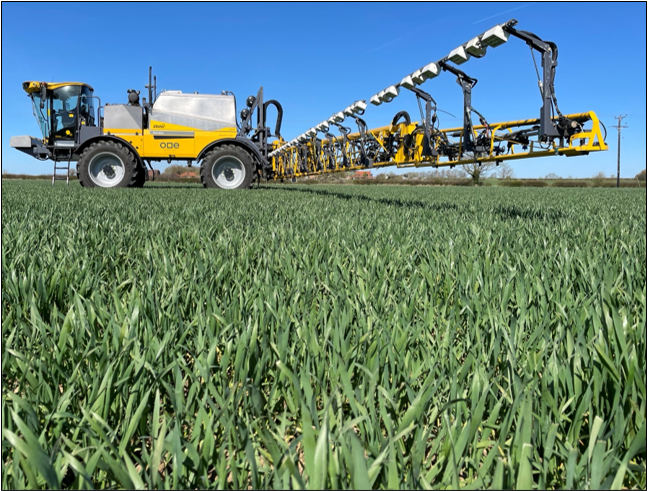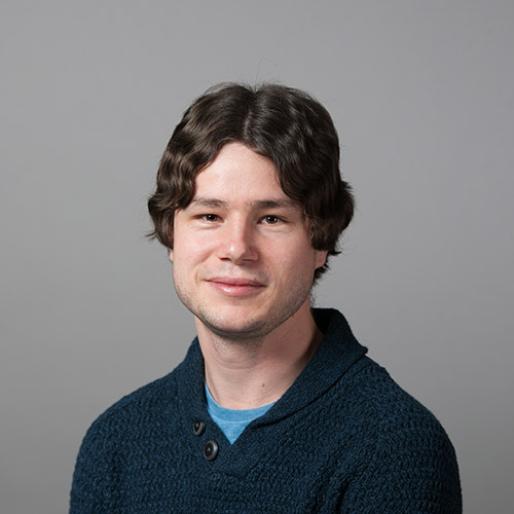The big picture: using wildflower strips for pest control
A partnership between Rothamsted with industry partners Bosch, Chafer Machinery, and Xarvio has shared specialist knowledge to bring about an innovative new approach to black-grass control.
Using artificial intelligence, cameras on a spray boom can detect black-grass (Alopecurus myosuroides) at a range of growth stages of the weed. The system then ensures the correct amount of herbicide is sprayed onto that area of the field.
The new approach should both reduce costs by spraying smaller areas of a field and result in black-grass prevalence being reduced.
Rothamsted Research helped to train the Bosch cameras to spot black-grass by photographing both the crop, and weed plants from a fixed height, over a range of plant developmental stages. An artificial intelligence algorithm was then trained to apply this knowledge to images that came from cameras being driven over real fields across a whole farm. The camera doesn’t request the sprayer to target a particular plant. Instead, it asks the sprayer to target an area where it can see black-grass is growing so the technique is in effect map-based rather than targeting individual plants.
Experiments with a Chafer Machinery sprayer using different numbers of cameras and boom heights resulted in a working set up of 28 cameras set at a height of 1.1 metres.
Each partner contributed to the final application according to their own relevant expertise. Xarvio undertook the the agronomics, exploring which chemicals to use, Chafer adapted its machinery and Bosch led the technological implementation.
This project allowed us to bring the knowledge we have acquired over many years of studying the black-grass problem, and combine it with state-of the art technology.
Dr David Comont
Peter Frankland of Bosch said, “Rothamsted gave us the understanding of types of cultivation that farmers use and some methods of solving the black-grass problem without using chemicals. Farmers are increasingly adopting no-till or low-till methods and so weed control becomes a more significant challenge. Unlike ploughing, which buries black-grass seeds and prevents germination, these practices leave seeds closer to the surface.”

Rothamsted’s Dr David Comont added, “Black-grass is a particularly troublesome weed, and growers have had to resort to increasingly complex and expensive mixtures of herbicides to control it. The strength of this approach is that by targeting herbicides only where they are needed, we can both redece the amount of herbicide being used and the cost to the grower, while still mainitaining control of this weed. This project allowed us to bring the knowledge we have acquired over many years of studying the black-grass problem, and combine it with Bosch’s state-of the art technology and the specialist knowledge of the other partners, to make significant progress towards this precision-spraying solution.“
Rothamsted helped to train the weed-detection algorithms by working directly with the images captured by Chafer. Over many hours, Rothamsted’s trained field team painstakingly annotated almost 5000 images taken in the field, marking up over 12,000 black-grass plants and 10,000 other weeds. The team then helped validate the results by mapping blackgrass across the whole farm scanned by the Chafer sprayer, mapping the black-grass infestation across more than 100 hectares repeatedly over three years.
One of the more challenging aspects of the project was to train the AI. Muhammad Kassem, AI Expert at Bosch, explained, “Overall, we scanned around 5000 images, covering a variety of different seasons and where Black-grass is growing among different crops, not only wheat but also barley. Each time the sprayer completed a pass across the field we generated such a high volume of images that it took a couple of days to download them all. Then we used coding to clean up the images, another code to convert them to the right file format and a final code to train the AI algorithm. It was a fantastic project and we've come out of it with good accuracy and that's the key measure.”
Funding for the project was came frorm DEFRA’s Farming Innovation Programme and the UKRI Transforming Food Production challenge.

Ecologist
Rothamsted Research is the longest-running agricultural research institute in the world. We work from gene to field with a proud history of ground-breaking
discoveries in areas as diverse as crop management, statistical interpretation and soil health. Our founders, in 1843, were the pioneers of modern
agriculture, and we are known for our imaginative science and our collaborative approach to developing innovative farm practice.
Through independent research, we make significant contributions to improving agri-food systems in the UK and internationally, with
economic impact estimated to exceed £3 bn in annual contribution to the UK economy. Our strength lies in our systems approach, which combines strategic research,
interdisciplinary teams and multiple partnerships.
Rothamsted is home to three unique National Bioscience Research Infrastructures which are open to researchers from all over the world:
The Long-Term Experiments,
Rothamsted Insect Survey and the
North Wyke Farm Platform.
We are strategically funded by the Biotechnology and Biological Sciences Research Council (BBSRC), with additional support from other national and
international funding streams, and from industry. We are also supported by the Lawes Agricultural Trust (LAT).
The Biotechnology and Biological Sciences Research Council is part of UK Research and Innovation, a non-departmental public body funded by a grant-in-aid
from the UK government.
BBSRC invests to push back the frontiers of biology and deliver a healthy, prosperous and sustainable future. Through our investments, we build and support a vibrant,
dynamic and inclusive community which delivers ground-breaking discoveries and develops bio-based solutions that contribute to tackling global challenges,
such as sustainable food production, climate change, and healthy ageing.
As part of UK Research and Innovation (UKRI), we not only play a pivotal role in fostering connections that enable the UK’s world-class research and innovation system
to flourish – we also have a responsibility to enable the creation of a research culture that is diverse, resilient, and engaged.
BBSRC proudly forges interdisciplinary collaborations where excellent bioscience has a fundamental role. We pioneer approaches that enhance the equality, diversity,
and inclusion of talent by investing in people, infrastructure, technologies, and partnerships on a global scale.
The Lawes Agricultural Trust, established in 1889 by Sir John Bennet Lawes, supports Rothamsted Research’s national and international agricultural science through the provision of land, facilities and funding. LAT, a charitable trust, owns the estates at Harpenden and Broom's Barn, including many of the buildings used by Rothamsted Research. LAT provides an annual research grant to the Director, accommodation for nearly 200 people, and support for fellowships for young scientists from developing countries. LAT also makes capital grants to help modernise facilities at Rothamsted, or invests in new buildings.